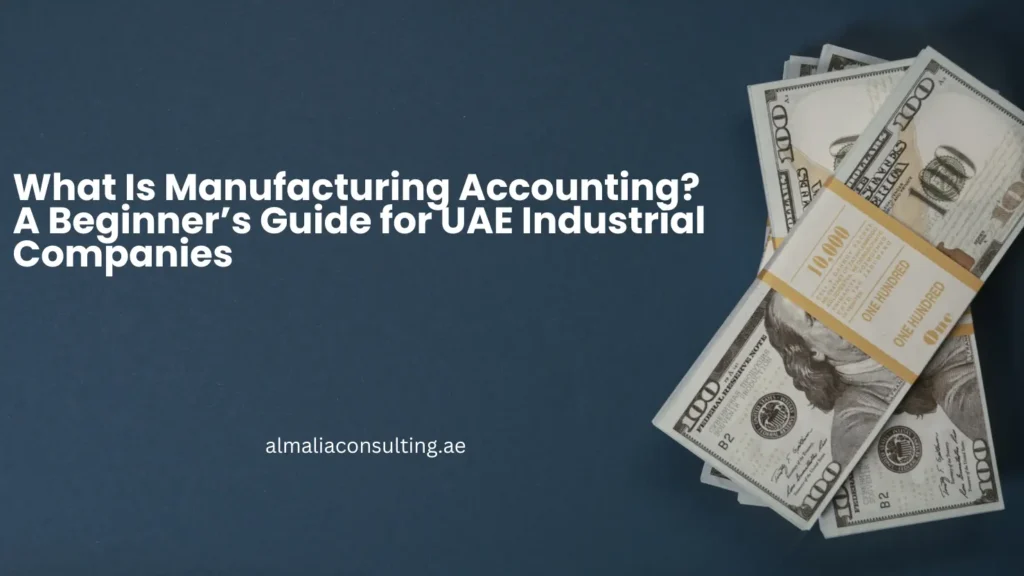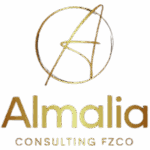
What Is Manufacturing Accounting? A Beginner’s Guide for UAE Industrial Companies
The manufacturing industry in the UAE is growing rapidly, supported by government initiatives, free zones, and increasing global demand. With this growth comes the need for precise financial management. That’s where Manufacturing Accounting plays a critical role.
For industrial companies in the UAE, Manufacturing Accounting is not just about keeping records—it’s about understanding the true cost of production, improving profitability, and ensuring compliance with corporate tax and VAT regulations. At Almalia Consulting, we specialize in providing tailored accounting and bookkeeping solutions, helping manufacturers maintain financial clarity and long-term success.This beginner’s guide will help you understand the basics of Manufacturing Accounting and why it is essential for businesses in the UAE.
What Is Manufacturing Accounting?
Manufacturing Accounting is a specialized branch of accounting that focuses on tracking, analyzing, and reporting the financial aspects of production. Unlike general accounting, which deals mainly with revenue and expenses, Manufacturing Accounting dives deeper into the cost structure of manufacturing operations.
It covers three primary cost areas:
- Direct Materials: The raw materials directly used in creating a product.
- Direct Materials: The raw materials directly used in creating a product.
- Direct Labor: The wages and benefits of workers who are directly involved in production.
- Manufacturing Overheads: Indirect costs such as factory rent, utilities, machine maintenance, and depreciation.
By collecting and analyzing this data, Manufacturing Accounting provides accurate insights into how much it truly costs to manufacture goods.
Why Manufacturing Accounting Is Important for UAE Industrial Companies
The UAE government is actively promoting industrial development through initiatives like Operation 300bn and various free zone incentives. With this rapid growth, companies must stay competitive by controlling costs and optimizing efficiency.
Manufacturing Accounting supports this in several ways:
Accurate Costing – Knowing the exact cost of raw materials, labor, and overhead ensures that companies can price products correctly and maintain healthy profit margins.
Inventory Control – Proper accounting helps in managing stock levels, avoiding shortages, and reducing waste.
Compliance with UAE Laws – With the introduction of corporate tax and VAT, companies must maintain transparent records. Manufacturing Accounting ensures accurate reporting to meet FTA requirements.
Profitability Analysis – By analyzing production costs and sales revenue, businesses can identify their most profitable products and make informed strategic decisions.
Budgeting and Forecasting – It provides a financial roadmap for growth, helping companies prepare for expansion while keeping costs under control.
Key Components of Manufacturing Accounting
1. Direct Materials
These include all raw materials used in the production process. Tracking direct materials allows companies to monitor usage, control wastage, and negotiate better deals with suppliers.
2. Direct Labor
Direct labor represents the workforce directly involved in manufacturing. Recording and analyzing these costs helps companies assess productivity and optimize labor efficiency.
3. Manufacturing Overheads
Overheads include indirect costs like electricity, water, insurance, and factory maintenance. Allocating these costs correctly ensures a realistic picture of the total production expense.
4. Work in Progress (WIP)
Not all products are completed within the same accounting period. WIP tracking ensures that partially finished goods are accounted for properly.
5. Cost of Goods Manufactured (COGM)
This is the total cost of goods completed during a specific time frame. It combines direct materials, direct labor, and allocated overhead.
6. Cost of Goods Sold (COGS)
Once finished goods are sold, their costs are transferred from inventory to COGS. This figure directly impacts profitability and tax calculations.
Benefits of Manufacturing Accounting for UAE Companies
Enhanced Decision Making – Managers can make better operational and strategic decisions by understanding the cost structure.
Improved Efficiency – Identifying inefficiencies in production helps in reducing waste and improving resource utilization.
Stronger Financial Control – With transparent cost allocation, businesses can plan budgets and track financial performance effectively.
Compliance with FTA – Accurate Manufacturing Accounting ensures VAT and corporate tax filings are correct, avoiding penalties.
Competitive Advantage – Companies that manage costs effectively can offer competitive pricing while still maintaining profitability.
Challenges in Implementing Manufacturing Accounting
While Manufacturing Accounting is essential, UAE industrial companies often face challenges, such as:
-
Complex Supply Chains – Sourcing raw materials from multiple vendors across different countries can complicate cost tracking.
-
Volatile Material Prices – Fluctuations in raw material costs can affect accurate costing.
-
Technological Integration – Many companies still use outdated systems, making it harder to track expenses in real time.
-
Regulatory Compliance – Staying updated with UAE’s evolving tax and accounting regulations requires constant attention.
